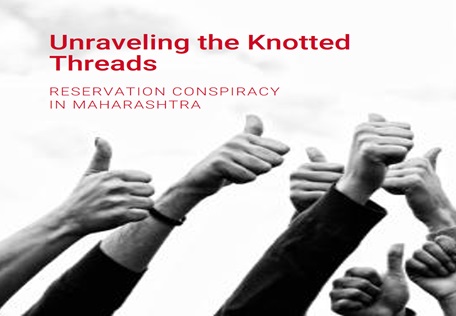The air in Maharashtra crackles with a potent mix of hope and despair. It’s a state where dreams of social mobility dance amongst shadows of entrenched inequalities. At the heart of this complex equation lies the contentious issue of reservation, a potent political firebrand that continues to spark heated debates and simmering unrest.
The reservation policy, conceived as a tool for affirmative action, aimed to bridge the historical gap between socially and educationally backward communities and the rest of society. In Maharashtra, the Maratha community, a dominant yet economically diverse group, stands at the forefront of this ongoing tug-of-war.
Their demand for reservation stems from a complex narrative. While sections of the Marathas face socio-economic challenges, others prosper in agriculture, business, and politics. This internal disparity fuels accusations of ‘quota-mongering’ from communities already categorized as backward classes. However, Maratha proponents counters that crippling debt, farmer suicides, and a lack of adequate educational opportunities plague certain segments of their community, justifying their need for affirmative action.
The Supreme Court’s 2021 verdict, striking down the Maharashtra State Reservation for Socially and Educationally Backward Classes (SEBC) Act, 2018, which granted 16% reservation for Marathas in education and jobs, dealt a severe blow. This triggered accusations of a sinister “reservation conspiracy” aimed at denying Marathas their rightful claim to progress.
But unraveling this alleged conspiracy necessitates examining its strands:
Political Maneuvering: The issue becomes a pawn in the political chessboard. Parties exploit anxieties, make promises, and engage in brinkmanship, fueling polarization and stalling meaningful solutions. The recent Maratha protests with slogans like “Dhokha nahi chalega” (Enough of deceit) highlight this frustration.
Misinformation and Propaganda: Social media becomes a breeding ground for unverified claims and rumors, pitting communities against each other. Fabricated stories of non-reserved candidates securing top positions fuel resentment, while accusations of fake caste certificates add fuel to the fire.
Economic Considerations: Reservation also has economic implications. Critics argue that exceeding the 50% limit set by the Supreme Court for reservations threatens meritocracy and efficiency. Concerns arise about a potential decrease in qualification in reserved positions.
The Social Fault Lines: Beneath the political game and economic anxieties lies a deeper socio-cultural fissure. Centuries of social hierarchies and exclusion leave scars that reservation policies attempt to heal. However, its implementation often exacerbates existing divisions, breeding a ‘them vs. us’ mentality instead of fostering inclusive progress.
Finding a solution requires navigating these intertwined complexities. Firstly, fostering open dialogue and fact-based discussions can dispel misinformation and promote understanding. Data-driven assessments of the Maratha community’s internal socioeconomic disparities can help develop targeted interventions.
Secondly, a focus on quality education and skill development for all communities, regardless of caste, is crucial. By equipping individuals with relevant skills and qualifications, concerns about meritocracy can be addressed.
Furthermore, exploring alternative affirmative action measures like scholarships, financial aid, and mentorship programs can be considered alongside, or possibly in place of, reservations. This could potentially provide targeted support while minimizing unintended consequences on other communities.
Finally, political parties must move beyond playing to populist sentiments and engage in sincere efforts to find a balanced and sustainable solution. This solution should address the genuine needs of the Maratha community while protecting the rights and opportunities of other groups.
The “reservation conspiracy” narrative offers a simplistic explanation for a complex societal challenge. Unraveling its threads requires acknowledging the legitimate concerns of all stakeholders, engaging in honest dialogue, and finding ways to bridge the socio-economic gap, not widen it. Only then can the promise of true equality and shared prosperity truly come alive in Maharashtra.
Note: This article is intended to provide a balanced perspective on the complex issue of reservation in Maharashtra. It does not offer definitive solutions or endorse any particular viewpoint. Please consider this as a starting point for further research and discussion.
Resources:
- Reservation Gazette in 1994
- Current (2024) Caste Certificate Issuing Policy



I am really impressed along with your writing abilities and also with the format to your blog. Is this a paid topic or did you modify it yourself? Anyway stay up the nice high quality writing, it抯 rare to see a nice blog like this one today..
Hello, Neat post. There’s an issue with your website in web explorer, may test this?IE nonetheless is the marketplace leader and a big component of people will omit your wonderful writing because of this problem.
‘IE’ is old browser, be comfortable with ‘EDGE’
I really appreciate this post. I抳e been looking all over for this! Thank goodness I found it on Bing. You’ve made my day! Thanks again
It抯 really a great and useful piece of info. I am glad that you shared this helpful info with us. Please keep us up to date like this. Thanks for sharing.
As I website possessor I believe the articles here is real great, regards for your efforts.
Just about all of the things you state happens to be astonishingly precise and that makes me wonder why I hadn’t looked at this with this light previously. Your piece truly did switch the light on for me personally as far as this particular subject goes. But at this time there is 1 factor I am not really too comfy with and while I make an effort to reconcile that with the actual central idea of the point, allow me see just what all the rest of the visitors have to point out.Very well done.